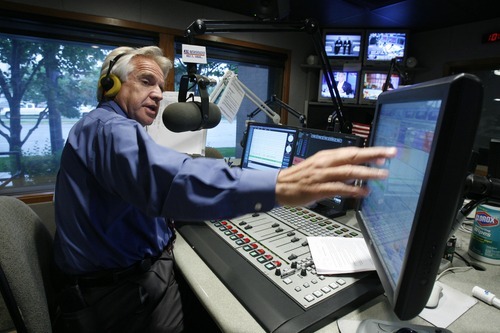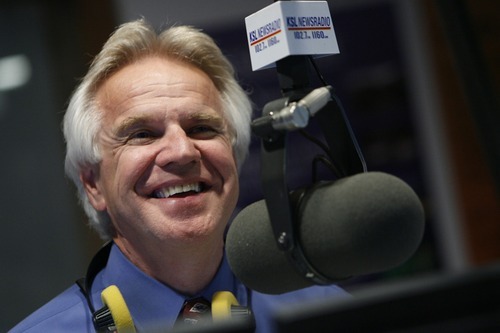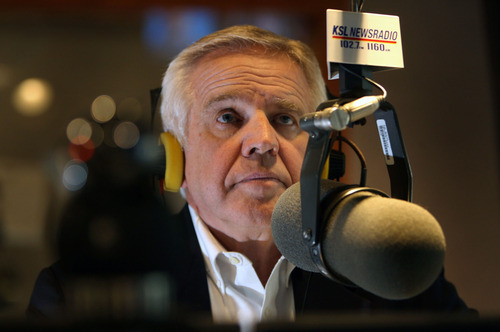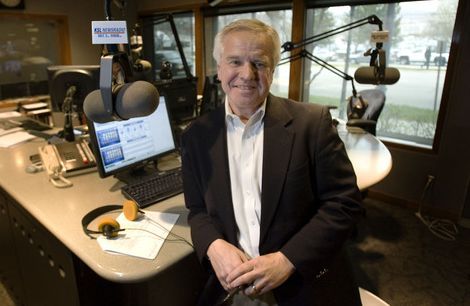This is an archived article that was published on sltrib.com in 2011, and information in the article may be outdated. It is provided only for personal research purposes and may not be reprinted.
It's 10 a.m. on March 15, and in the KSL radio studio Doug Wright is interrogating, in his trademark nonconfrontational way, state Rep. Kraig Powell, R-Heber City.
Powell has found himself in the middle of a political firestorm after apologizing in the Uintah Basin Standard for voting for HB477, a bill quickly passed in the closing days of the recent legislative session that would dramatically alter the state's rules about releasing government records.
Powell claimed Republican House leaders "blackmailed" him into voting for the bill, which he now labels an "abomination."
Every major news agency in the state has been trying to score an interview with Powell, but they'll have to wait until a news conference later in the day. Instead, Wright has the elusive lawmaker in his KSL studio, one on one, while political reporters can only listen, fume and comment on Twitter about the interview.
It's the latest example of the influence Wright has developed over the years through his gentle and respectful — critics might label it "fawning" — interviewing style.
Powell joins a long line of politicians — including former Gov. Jon Huntsman Jr., former Rep. Chris Cannon, U.S. Reps. Rob Bishop and Jason Chaffetz, Sen. Orrin Hatch and former Sen. Bob Bennett — who use Wright's show as a platform to reach Utah voters.
Beyond Utah politics, the general interest talk show also takes on other local and national events, and focuses on movie reviews on Fridays.
Yet the show has become known as the premier place to announce political intentions, even for Democrats such as Salt Lake County Mayor Peter Corroon, who ran for governor in 2010. Increasingly, though, Wright is becoming the go-to guy when politicians find themselves in a mess.
Gov. Gary Herbert sought sanctuary on Wright's show a week before Powell's mea culpa. With Wright's help, the governor tried to explain why he failed to veto HB477, which outraged open-government supporters. Critics claim the law flies in the face of the trend toward government transparency and will conceal public business when it's conducted by lawmakers via electronic messages.
—
Pandering or respectful? • Today, despite criticism that Wright panders to politicians by lobbing softball questions, he is closing in on Powell in his homey, aw-shucks style.
Powell, stuck between angry constituents and powerful Republican party leaders, is trying to have it both ways: He maintains he voted for HB477 because he feared House leaders would kill legislation important to his district. Yet in the next breath, he backpedals, saying he never was threatened overtly.
For the record, House Speaker Becky Lockhart denies that leaders put any pressure on Powell to support HB477.
Again and again, Wright tries to nail Powell down on the lawmaker's earlier allegations of intimidation and subterfuge. He asks: "Did you feel taken advantage of? Ramrodded? Coerced?," his string of questions wrapped in that "Utah-nice" tone that some listeners find comforting.
"There's the absolute twisting of arms," Wright says. "Then there's the standing-off-in-the-corner giving — it's kind of that Mom look — hands on the hips: 'You better get ready, I'm watching what you are doing here.' "
Powell vacillates, and with the interview approaching its end, Wright lays out the media's suspicions: GOP leaders seem to have "engineered" HB477 to fly through without debate or public scrutiny.
As the clock on the studio wall ticks toward the hour, Wright shifts to the tone many of his detractors find insufferable. "The thing that is still so hard for me, and pardon me, because this is an ache I have. I love this state," he says. "What does it say about our legislative process? What does it say — about our leadership?"
Outside the studio, sarcastic comments echo across the Twitterverse: "Doug Wright aches for Utah," tweets one political reporter. "I ache for everyone who had to listen to that."
—
'I'm Joe Average' • Wright's show reaches 145,000 listeners Monday through Friday, dominating the radio dial's 9 a.m.-to-noon time slot. The vast majority of those listeners, Wright acknowledges, likely are moderate Republican and Mormon, likely as Utah-nice as Wright's own questioning style.
With Wright's huge following in the middle of Utah's political spectrum, being interviewed by "the most trusted voice in Utah" has strong appeal to politicians, says Kirk Jowers, director of the University of Utah's Hinckley Institute of Politics.
"He is respected as a fair interviewer by everyone but those at the extremes of either party," Jowers says. "There is an understanding that if [an office holder] is coming on, [Wright] will not be impolite."
Wright, 59, was raised in Salt Lake City's Sugar House neighborhood and started in radio by volunteering at the University of Utah's KUER while in high school. Over 43 years he worked his way up, including running tiny KDYL in Tooele and working as a rock disc jockey at KCPX.
Since 1978, he's been an institution at The Church of Jesus Christ of Latter-day Saints-owned KSL, Utah's dominant news and talk station. Wright often reminds listeners that his Mormon roots can be traced back to the state's earliest pioneer settlers.
He is modest about his role in Utah politics. "I like to think I'm the middleman, a facilitator and a clearinghouse for the information that is going around. I'm Joe Average enough that I ask the stupid question."
Wright is a voice of moderation, says Claudia Wright (no relation), a left-leaning Democrat who in 2010 forced Blue Dog Democratic Rep. Jim Matheson into his first primary race. "Doug's a gentleman and is even-handed," Claudia Wright says. "He's one of the easier people to talk to in the press."
Wright jokes that he considers himself a conservative Republican, but with the recent shift to the right in Utah and national politics, "some people call me a flaming liberal."
—
Utah's 'thinkmaster'? • As for criticism of his kindly, almost reverent, interview style, Wright argues that the right's red-meat talk radio is "cop-out" radio. "It's like getting people to watch a train wreck," he says. "That's easy radio. It's easy to get people stirred up. It's easy to scare people because a lot of people are scared."
Not surprisingly, in the era of tea-party politics and hard-line immigration reform, not everyone is delighted with Wright's mellifluous voice of moderation, his aversion to radicalism, right or left, and his calls for reason and compassion.
Some GOP activists, such as Mike Ridgway, complain that Wright props up the state's GOP establishment. (Worth noting is that it was the same GOP establishment that stripped Ridgway of his seat on the Salt Lake County Republican Executive Committee and on the state party's Central Committee.)
Party bosses, Ridgway claims, have cynically sold out Utah's conservative heritage, while pushing through laws diminishing political power at the local level.
"His audience is cultural Mormons and I don't mean that in a good way," says Ridgway, who labels himself a devout Mormon. Ridgway defines "cultural Mormons" as "Mormons who do what they think the culture expects of them," while never questioning ecclesiastical or political leaders.
"He is Utah's thinkmaster," Ridgway says. "You can turn your minds off now. Listen to Doug."
The left lodges similar criticism. Jeff Bell, a Democratic Party activist and one-time KSL talk-show host, calls Wright a "star sniffer," too much in awe of office holders who deign to come on his show.
"He's a guy who has perfectly molded himself to his regional culture," Bell says. "His rhetoric is so sticky sweet you almost don't notice that you are being led down a path. Doug's not frightening [like Sean Hannity or Glenn Beck],but he's influential."
Still, Bell offers Wright some praise: "There's a lot of places where Doug is the responsible voice on the right," Bells says, especially on immigration and gay rights. Wright supports local antidiscrimination laws, although he doesn't support gay marriage.
For better or worse, Bell says, "Doug is the last big voice in Utah."
Tea-party activist Jacqueline Smith, a leader in Save the American Republic, distrusts Wright because on the show he has argued for a shift away from Utah's caucus system to more primary elections. She fears that would move the state further away from the representative republic form of government that she believes the founders intended.
"Doug tends to lean a little further to the liberal side," Smith says. On the other hand, she listens to his show, preferring it to "turn-off" Hannity (the abrasive national radio host whom KSL dropped last year).
"I don't appreciate all that negativity," Smith says. "I do appreciate someone who is willing to hear both sides. Doug tries to look at both sides with a fairly objective lens."
—
Utah's 'compassion monger' • Wright makes no pretense of being a journalist or unbiased; for example, he is carrying a petition for the repeal of HB477.
Yet as a prominent radio personality, he has been attacked by the right for supporting a "compassionate" approach to immigration reform. His views align closely with those of the LDS Church and not with Utah's "rule of law," enforcement-only contingent.
"People are uncomfortable with the marginalization of entire groups of people, colors of people, cultures of people," Wright says of his listeners.
Conservative Utahns love the musical "Les Misérables," he muses, but fail to apply its themes of compassion, Christian mercy and understanding to the real world.
"They walk out of 'Les Miz' weeping and humming the 'Les Miz' tunes," he says. "But when it comes to immigration, it's 'round 'em up, run 'em out.' "
And for its part, KSL capitalizes on the criticism. One station promo proclaims: "Doug Wright: When the right calls him a 'compassion-monger' and the left fires off angry emails — you know he's on target!"
—
A taste of real-world politics • In 2006, Wright says the state Republican party approached him to run against the 2nd District incumbent, U.S. Rep. Jim Matheson. Some party leaders believed Matheson, a conservative Democrat, could best be challenged by a moderate Republican.
"I really started considering it," says Wright of his first foray into politics. But after a trip to Washington and some initial fundraising, he aborted the campaign. He backed out, Wright says, after he learned he couldn't count on solid commitment from the party in what would be a hard-fought race against Matheson. (Wright would have had to resign from KSL under the FCC's Fairness Doctrine.)
Wright expected he would have been savaged as being too moderate at the GOP convention. "I saw the same old scenario was unfolding and the Utah Republican Party was going to beat itself into a bloody pulp."
Wright, as a media personality with high name recognition, unreasonably expected a "coronation" at the state convention, say GOP insiders, including Ridgway.
"A fond memory" is how Wright refers to his first personal taste of politics; he doesn't rule out a future run. He acknowledges that Republican insiders contacted him four years ago about running for a proposed at-large fourth Congressional seat for Utah.
Political insiders, inlcuding Jowers, say that with Utah's political complexion, it's unlikely Wright could ever reach a primary — where he probably would do quite well with voters.
—
'The hardest thing' • Another factor in any plans is Wright's ongoing grief, which he labels "the hardest thing I've ever faced." Last September, his son Eric died in an accidental fall from a building in Washington, D.C., after beginning an internship with Rep. Bishop.
"He's on my mind every hour of the day," Wright says, his voice breaking. "I feel like the solar system of our family has lost a planet and we are out of whack. It's unimaginable. It's out of order. Your parents, even your spouse. But you never think one of your kids will die before you. Never in a million years."
His loss, Wright says, has made him more tender. "I appreciate life more. I pray every day that I can focus more on what I have, instead of what I've lost."
As for the future: "Right now, I enjoy what I do. This sounds corny, but I hope our show does some good."
Pandering or respectful? Hear the 'big voice'
You can hear podcasts of Doug Wright's interviews, including with Rep. Kraig Powell, here: http://www.ksl.com/index.php?sid=&nid=399
Mike Ridgway's blog: mike-ridgway.blogspot.com/
Jeff Bell's blog: jmbell.org/blog/
Coalville Save the American Republic blog: http://www.meetup.com/TheSTARForum/









